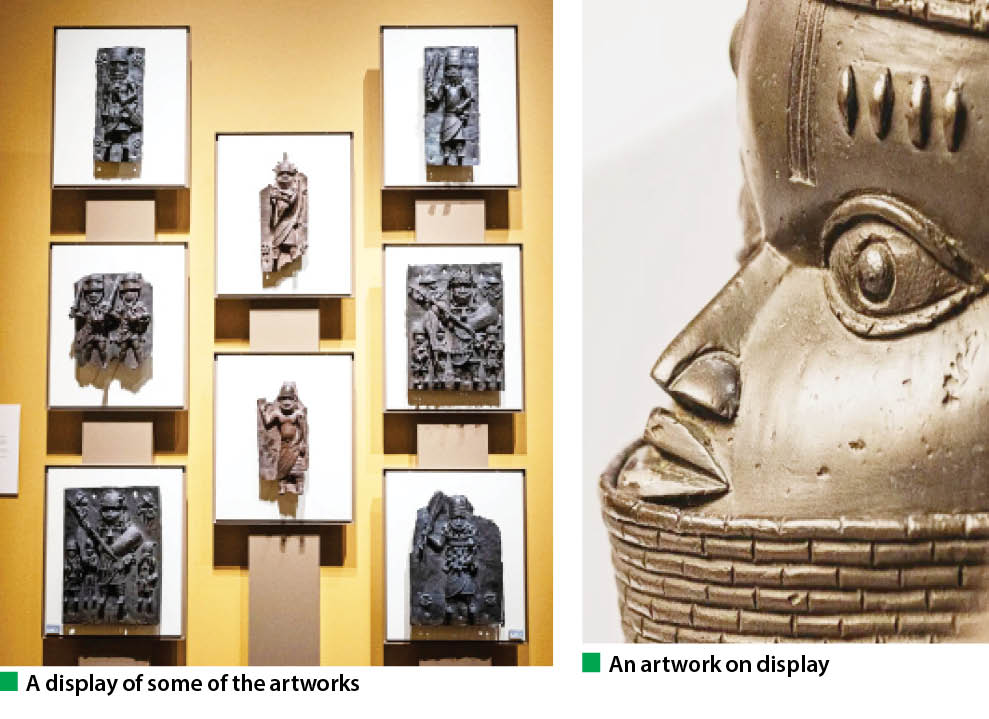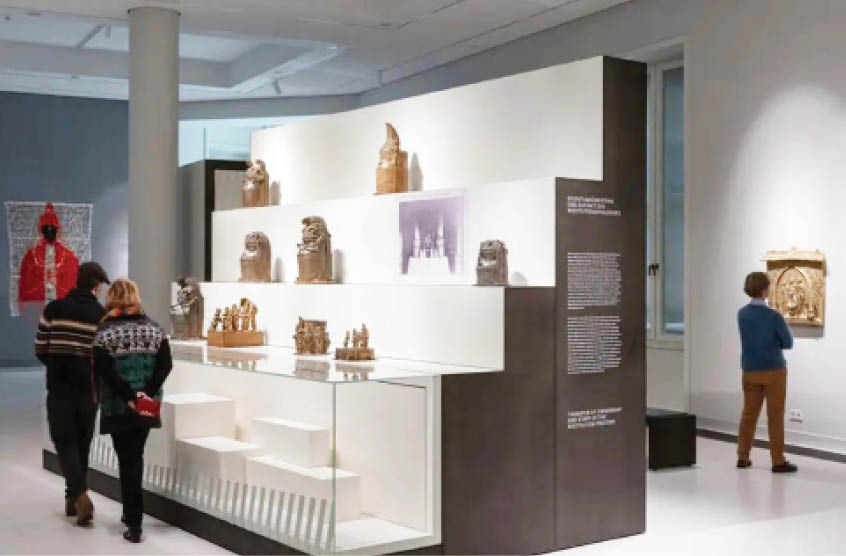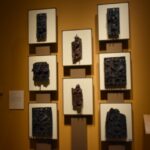After years of ignored pleas and stonewalled requests, deals were finally coming together to return some of Africa’s most prized treasures to the continent.
The Smithsonian Institution, the Metropolitan Museum of Art and the German government announced they were returning scores of sculptures, plaques and ornaments, known as the Benin Bronzes, that British soldiers had plundered in 1897 from Benin City, in what is now Nigeria but was once the center of a kingdom. Plans were underway for a glittering new museum designed by the British Ghanaian architect David Adjaye to showcase and protect the returned treasures.
But that plan has run aground since Nigeria’s outgoing president announced he had transferred ownership of the looted items to a direct descendant of the ruler they had been stolen from. At a moment when museums worldwide are trying to come to grips with contested artifacts in their collections, this development underscores how complex restitution efforts can be.
The confusion began in March, when President Muhammadu Buhari of Nigeria, who left office on May 29, issued a declaration handing over the artifacts — which include decorated brass plaques, carved ivory statues and ceremonial masks — to Ewuare II, the current oba, or ceremonial king, of Benin. It decreed that any returned artifacts “may be kept within the palace of the oba,” or in any location that he considers. The announcement, which only recently came to light outside Nigeria, is widely seen as a move to end a long-running dispute over who is the rightful owner of the bronzes: Nigeria’s government, its National Commission of Museums and Monuments, or the oba himself.

- Govs Versus Godfathers: All Eyes On Kano, Rivers, Delta, Sokoto
- Maiduguri residents bemoan indiscriminate dumping of refuse
The oba wants the bronzes displayed in museums in Nigeria and around the world, a representative of the royal family said, but the passing of the treasures into private hands spread anxiety among some museums that are negotiating returns of looted items to Nigeria.
Last month, Cambridge University postponed a ceremony to hand back ownership of 116 bronzes. A spokesman said the university was still “in talks with all parties.”
But others in the museum sector, said that Western institutions should not interfere in the discussion. It was “none of the Smithsonian’s business” what happened to the bronzes now, said Linda St. Thomas, a spokeswoman for the museum, which last year handed ownership of 29 bronzes to Nigeria’s museum commission. Nigeria could “give them away, sell them, display them,” she said: “In other words, they can do whatever they want.”
Hermann Parzinger, the president of the body that oversees Berlin’s major publicly funded museums — where hundreds of bronzes are held — said in a news release there was “an urgent need for clarification” over who owns the items and whether they will still be displayed in Nigeria.
Last year, the German government signed an agreement with its Nigerian counterpart to transfer ownership of over 1,000 looted bronzes to Nigeria. In a symbolic gesture, Germany’s foreign minister flew to Nigeria in December, and handed back the first 20 items, with more scheduled to follow. President Buhari’s announcement caused consternation outside the museum world, too, with lawmakers and newspaper columnists in Germany questioning whether the country had acted hastily in transferring back the bronze collections.
Christiane Schenderlein, the cultural spokeswoman for the center-right Christian Democratic Union party, said that the bronzes were world treasures that should be on public display. The decision to hand them to an individual, without assurances that they would be exhibited, was “a disaster,” Schenderlein said.
Brigitta Hauser-Schäublin, a Swiss anthropologist who has written extensively on the bronzes, said that Germany hadn’t properly considered questions of ownership before returning the items. The Kingdom of Benin traded slaves for the metal used to make them, Hauser-Schäublin added, so the descendants of enslaved people should have been involved in negotiations about where they are displayed and who benefits from them.
The saga of the bronzes predates Nigeria as well as the British protectorates of Northern and Southern Nigeria that preceded it; instead the area was a diverse tapestry of kingdoms and empires. In 1897, about 1,200 British soldiers raided one, the Kingdom of Benin, hoping to depose its oba and take bloody revenge for the killing of some colonial officials.
When the soldiers entered the oba’s palace, they found a trove of priceless artifacts and looted the entire collection — hacking some of the bronzes from the palace walls — before dividing it up and taking much of it home to Britain. Thousands were killed in the raid, which is known as the Benin Massacre in Nigeria and is remembered as one of the bloodiest episodes perpetrated by the British.
Most of the looted collection was shipped to England, broken up and traded worldwide, becoming star attractions in dozens of august institutions including the British Museum in London, the Met in New York and the Field Museum in Chicago.
When Nigeria gained independence, in 1960, it began asking that the objects be returned, but success did not come until recently, when museums began to address colonial wrongs. In Benin City, there has been a huge jump in awareness about the looted objects in the last decade, and artists, historians and activists have intensified their calls for restitution. Opinion is divided over who should receive them, but many in Benin City feel that because the items were stolen before Nigeria existed, it would be inappropriate to hand them to its federal government.
Tensions simmered on the Nigerian side for years, and long before former President Buhari’s announcement, there were hints that the process of return would not be straightforward.
Most of the treasures were initially expected to be returned on loan to a trust that brought together representatives of the oba and regional and national governments. That organization planned to develop a new institution, called the Edo Museum of West African Art, as a home for many of the bronzes. In November 2020, Mr. Adjaye, the architect, revealed a design for the museum, saying he hoped to build it within five years. A few months later, in May 2021, Nigeria’s museums commission authorized the trust to negotiate with western museums and store any returned items.
But that plan quickly began to unravel. That same month, the oba, in a written statement to the news media, said that he should be the sole recipient of the treasures and that anyone working with the trust was “an enemy.”
To overcome the oba’s opposition, Nigerian officials developed other options. This March, Abba Tijani, the director general of the museum commission, told a meeting of Western museum officials that Nigeria would build a royal museum in Benin City, on behalf of the oba and his court, to display many of the returned items. Mr Tijani presented a vision for the museum, but no firm plans, according to two people who attended the meeting.
Just a few weeks afterward, President Buhari issued his surprise announcement.
In a phone interview, Mr. Tijani said he would challenge the president’s declaration. He declined to explain the legal grounds for the dispute, but said a three-page document authorizing the transfer contained errors.
Nigerian legal experts said in interviews that Mr Tijani would either need to go to court to force a change, or hope that Bola Tinubu, Nigeria’s new president, who took office on Monday, issues a declaration to override his predecessor’s.
But while the confusion around the announcement may have pumped the brakes on new returns, few museum administrators seemed to regret deciding to give back the bronzes. Barbara Plankensteiner, the director of the Museum am Rothenbaum, a major ethnographic institution in Hamburg, Germany, said that recent events showed that restitution was a complex process, likely to be hit by snags.
“The Benin Bronzes are colonial loot,” she said, and should be returned like any stolen property. It was up to Nigeria to decide what happened to the items in its possession, not former colonial powers, she added.
Ms. Plankensteiner said that much of the recent debate in Germany felt like a return to the colonial era, with newspaper columnists highlighting gory aspects of the Kingdom of Benin’s past, including slave-trading and human sacrifice, and suggesting Nigeria’s museums were incapable of looking after the bronzes. “I can understand that some Nigerians have found it really insulting,” Ms. Plankensteiner said.
In Benin City, there is certainly annoyance with the tenor of the discussion. Prince Aghatise Erediauwa, the oba’s younger brother and a representative for the royal court on matters concerning the bronzes, said in a telephone interview that any Western or Nigerian official criticizing the oba’s ownership was “making mischief.”
He noted that many of the bronzes have religious and ceremonial significance, and that the oba, who was educated at Rutgers University and the University of Wales, had campaigned for the bronzes’ return for decades, including when he worked at the United Nations in New York and, later, as Nigeria’s ambassador to Italy.
The oba had always been clear of his plans for the returned bronzes, Prince Erediauwa said: that they would be displayed in museums in Nigeria and around the world, where they could act “as ambassadors” for his kingdom and culture. But the oba had also been clear that he wanted his ownership respected, the prince said.
Victor Ehikhamenor, an artist who sits on the board of the trust developing the Edo Museum, said the institution would probably change tack to include more contemporary art if the bronzes are mainly displayed elsewhere.
Factions in Nigeria may be arguing over where that might be, Mr Ehikhamenor added, but the West should not try to meddle in those affairs. “Deal with your problems,” he said, “and we’ll deal with ours.”
Ruth Maclean contributed reporting.
Source: New York Times

 Join Daily Trust WhatsApp Community For Quick Access To News and Happenings Around You.
Join Daily Trust WhatsApp Community For Quick Access To News and Happenings Around You.


